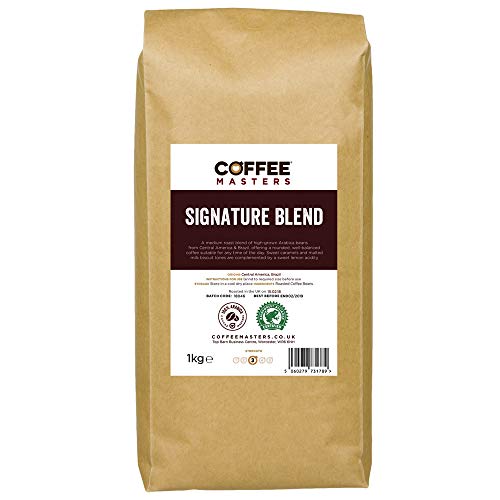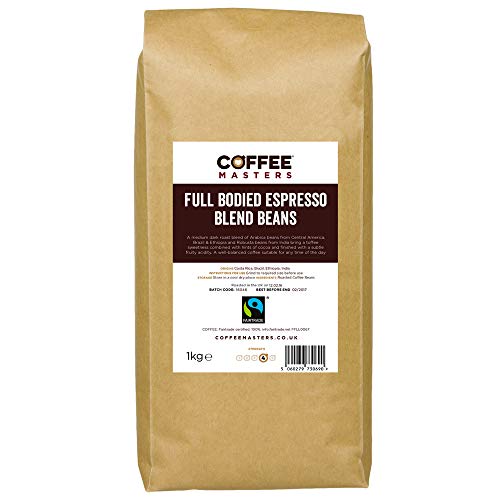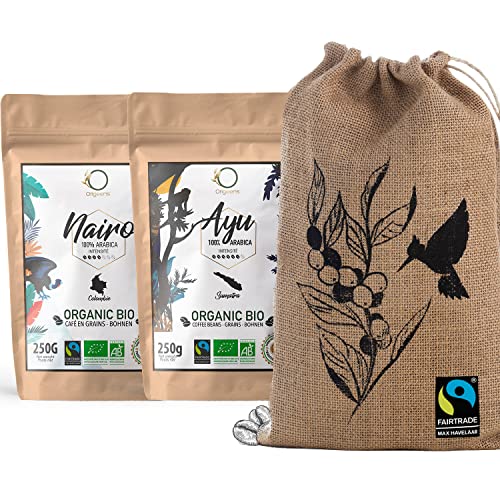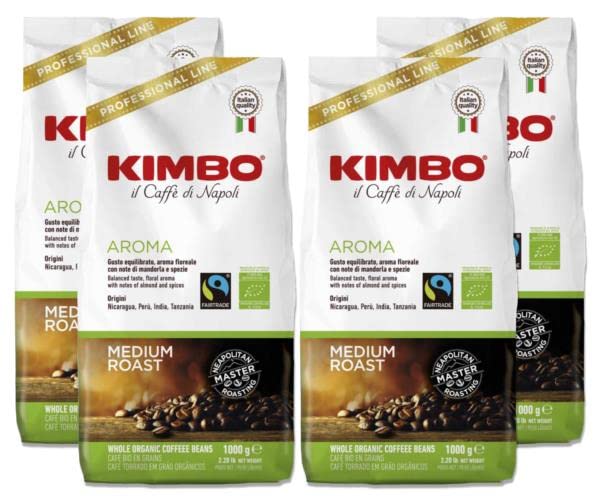At our ecommerce store, we believe that every cup of coffee can make a difference. That's why we offer a range of fair trade coffee products that support farmers and their communities. By choosing fair trade, you can enjoy a delicious cup of coffee while contributing to a sustainable and ethical industry.
Fair Trade Coffee Beans
Coffee that benefits farmers and communities
Product List

Signature Arabica Espresso Beans
Coffee Masters
Product Review Score
4.27 out of 5 stars
207 reviews$24.94





Our e-commerce store strives to provide our customers with only the best quality coffee that is ethically sourced. That is why we proudly offer fair-trade coffee from farmers who are paid fairly for their hard work. With fair trade coffee, you can enjoy your morning cup of coffee knowing that you support sustainable and dignified livelihoods for coffee farmers worldwide.
When you choose fair trade coffee, you are not only enjoying a delicious cup of coffee but also positively impacting the world. Fairtrade practices ensure that farmers are paid a fair price for their coffee beans, which helps support their families and communities. As a result, fair trade coffee is better for the environment and the people who work hard to bring that coffee to your morning cup.
Choose Fair Trade: Sip with Purpose
Welcome to the conscious consumer's guide to fair trade! This section will explore what fair trade is all about and why it matters. Whether you're a coffee lover, chocolate enthusiast, or want to make a difference, choosing fair trade products is a simple yet impactful way to support ethical practices and empower marginalized communities.
Fairtrade is a global movement that aims to promote social and economic justice for farmers and workers in developing countries. By ensuring fair prices, safe working conditions, and sustainable livelihoods, fair trade certification helps create equitable opportunities. When you purchase a fair trade product, you are directly contributing to the betterment of communities living in poverty, often deprived of fundamental rights and opportunities.
So, how can you identify fair trade products? Look for certification labels, such as the well-known Fairtrade International logo, which guarantees that farmers and workers receive fair wages and work under ethical conditions. Fairtrade products are typically sold by companies committed to transparency and sustainability. By supporting these companies, you become a part of a movement that encourages responsible business practices and seeks to uplift those often marginalized in the global economy.
The Power of Choice: Supporting Fair Trade Products
In a world filled with countless products and brands, it can be easy to overlook the impact of our choices on people and the planet. However, by consciously deciding to support fair trade products, we can make a positive difference in the lives of producers in developing countries.
So, what exactly is fair trade? It is a global movement that ensures better trading conditions and promotes sustainability. When we buy fair trade products, we support producers who have been paid fair wages for their labour, work in safe conditions, and follow environmentally friendly practices.
One of the areas where fair trade has a significant impact is the coffee industry. Coffee is one of the most valuable commodities globally, but many of the farmers who grow it live in poverty. By opting for fair trade coffee, we are helping these farmers earn a fair price for their beans, providing them with better resources to improve their livelihoods and support their communities.
But fair trade isn't limited to coffee. It extends to other products like chocolate, tea, bananas, and clothing. By choosing fair trade, we can actively contribute to empowering marginalized producers, ensuring the protection of workers' rights, and promoting sustainable agriculture.
Sip with Purpose: Exploring the World of Fair Trade
Fairtrade coffee not only provides you with a delicious cup of joe, but it also allows you to impact the world positively. By choosing fair trade, you support farmers and workers in developing countries, ensuring they receive fair wages and safe working conditions. So, let's dive into the fascinating world of fair trade and discover why it's a sip with purpose!
When you choose fair trade coffee, you are choosing a product that promotes sustainability. Fairtrade certification guarantees that the coffee has been produced using environmentally friendly practices. This means that harmful pesticides are not used, preserving the health of the farmers, their communities, and the planet.
Furthermore, fair trade provides economic empowerment. By paying farmers fair prices, fair trade enables them to improve their living conditions, invest in their farms, and support their families. Through fair trade, you contribute to the eradication of poverty and the development of more self-sufficient communities.
Finally, fair trade fosters a sense of global connection. When you sip your fair trade coffee, you are connected to the stories, cultures, and traditions of the people who cultivated and harvested those beans. It's a beautifully woven tapestry of flavours that transcends borders, reminding us that we are all interconnected and that our choices matter.
Impactful Sipping: How Fair Trade Benefits Communities
When choosing the type of coffee or tea we consume, the impacts of our choices reach far beyond our morning ritual. Opting for fair trade options allows us to sip with purpose and contribute to creating positive change in communities worldwide.
Fairtrade creates a sustainable and ethical supply chain that benefits producers and consumers. It ensures fair wages and safe working conditions for farmers and workers in countries where these standards may be overlooked. By buying fair trade, we support small-scale farmers and empower them to improve their livelihoods and invest in their communities. This means that our daily cup provides us with a delicious and comforting experience and uplifts and supports those who work hard to bring us these fantastic products.
Furthermore, fair trade also promotes environmentally sustainable practices. Many fair trade certifications require farmers to follow strict guidelines to protect the environment, such as avoiding harmful chemicals or implementing water conservation techniques. This helps preserve natural resources and promotes eco-friendly farming methods, safeguarding the planet for future generations.
In addition to its social and environmental benefits, fair trade encourages greater equality between genders. Women play a vital role in the production of coffee and tea in many countries, yet they often face significant gender-based barriers. Fairtrade empowers women by providing training, education, and resources, allowing them to actively participate in decision-making processes actively, often leading to improved social and economic conditions for them and their families.
Ethical Java: The Truth Behind Fair Trade Coffee
The coffee industry has recently faced increased scrutiny over its supply chain practices. Consumers are now more concerned than ever about the ethical sourcing of their morning brew. Enter fair trade coffee—a movement that seeks to address farmers' social, economic, and environmental challenges in coffee-growing regions worldwide. Ethical sourcing in the coffee industry has become a crucial topic, and for good reason.
Firstly, ethical sourcing ensures that coffee farmers receive fair compensation for their hard work and dedication. Many small-scale farmers who cultivate coffee beans struggle to make ends meet due to exploitative middlemen and volatile market prices. Fairtrade certification guarantees that farmers are paid a minimum price for their harvest, enabling them to earn a living wage and support their families. By choosing ethically sourced coffee, consumers directly contribute to combating poverty and improving the livelihoods of these farmers.
Furthermore, ethical sourcing promotes environmental sustainability in the coffee industry. Traditional coffee production often involves using harmful pesticides and deforestation to create space for coffee plantations. In contrast, fair trade certification requires farmers to adhere to strict environmental standards, such as practising organic farming methods, protecting biodiversity, and minimizing water usage. By supporting ethically sourced coffee, we can help conserve fragile ecosystems and prevent further planet degradation.
Lastly, ethical sourcing fosters community development and empowers marginalized groups. Fairtrade organizations provide resources and support to coffee-growing communities, helping them invest in education, healthcare, and infrastructure. Women, in particular, are often significant contributors to coffee cultivation but may face discrimination and limited opportunities. Ethical sourcing emphasizes gender equality and provides women a platform to participate in decision-making processes, gain leadership roles, and improve their socioeconomic status.
Fair Trade Coffee: A Sustainable and Equitable Option
Are you a coffee lover concerned about the impact of your daily ritual on the world around you? If so, fair trade coffee offers a sustainable and equitable option that allows you to enjoy your brew guilt-free. Unlike conventional coffee production, fair trade practices ensure that workers receive fair wages and are protected from exploitative labour conditions.
But fair trade is not just about the workers; it also aims to promote environmentally friendly practices. Many fair-trade coffee cooperatives embrace organic and sustainable farming methods. Fair trade farmers protect their health and the planet's biodiversity by eschewing harmful pesticides and chemical fertilisers. So, when you choose fair trade coffee, you are not only supporting fair wages but also contributing to a healthier ecosystem.
In addition to supporting social and environmental sustainability, fair trade coffee provides a superior cup of java. Fair trade beans are often grown at higher elevations, benefiting from ideal climates and nutrient-rich soil. These growing conditions lead to beans with greater complexity and depth of flavour, resulting in a more delightful and memorable coffee experience for you.
Uncovering the Social Impact of Ethical Java
When we sip our favourite cup of coffee in the morning, we often don't stop to think about the stories behind those aromatic beans. However, a growing movement seeks to uncover the social impact of the Java we so cherish. Enter ethical Java, a concept beyond simply enjoying a flavorful cup of joe.
So, what exactly is ethical Java? In a nutshell, it refers to coffee produced in an environmentally sustainable and socially just way. This means that the coffee farmers receive fair wages, work in safe conditions, and are treated with dignity. It also entails promoting biodiversity and using methods that minimize the negative impact on the environment.
The social impact of ethical Java is far-reaching. By supporting fair trade practices, consumers can empower coffee farmers in developing countries, who often face exploitative working conditions and low incomes. Ethical Java ensures that these farmers receive fair compensation for their labour and can improve their livelihoods. Additionally, it encourages the preservation of local ecosystems by discouraging harmful pesticides and promoting sustainable farming practices.
The Real Story Behind Fair Trade Coffee
When you take your first sip of that steaming cup of coffee in the morning, do you ever wonder about its journey to reach your cup? Most of us don't give it a second thought, yet the truth behind the coffee industry is both fascinating and, at times, alarming. One term that has gained significant attention recently is "Fair Trade Coffee," which aims to ensure ethical practices and fair treatment for coffee farmers and workers.
But what does Fair Trade Coffee mean? Simply put, it is a certification system that guarantees coffee producers receive fair prices for their harvest. This helps them maintain sustainable practices, support their families, and invest in their communities. The concept was born in the 1980s, driven by organizations and conscious consumers seeking to address the exploitation faced by small farmers due to volatile market prices and unfair trading practices.
By purchasing Fair Trade Coffee, consumers become part of a global movement that champions social and environmental justice. The certification process ensures that farmers comply with specific regulations, including fair wages, safe working conditions, and environmentally friendly farming techniques. Organic certifications often go hand-in-hand with Fair Trade, indicating that the coffee has been grown without synthetic pesticides or chemicals. Furthermore, the Fair Trade model empowers farmers by providing access to credit and training programs, helping them escape poverty and build sustainable livelihoods in the long run.
While the Fair Trade Coffee movement has undoubtedly brought benefits to many farmers and communities, it is not without its critics. Some argue that the certification process can be costly, making it less accessible for small farmers. Additionally, there are concerns that larger plantations might exploit the system by labeling only a small portion of their production as Fair Trade while still operating unethically on a larger scale. Therefore, it is important for consumers to research brands and certifications, supporting those with a proven commitment to ethical practices.